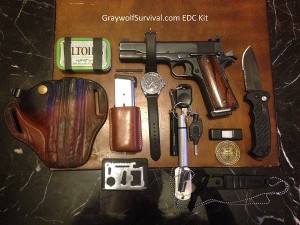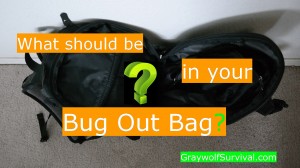 Five suggestions on how to protect your home
Five suggestions on how to protect your home
Keeping your home safe is one of the most important things a person can consider and yet most people don’t do much more than lock their front door. As a prepper, you should know already that there are many considerations in how to protect your family and your property. Each of these considerations will differ based on not only what you have to protect but what you are protecting it from. I’ve done a lot of Threat Vulnerability Assessments for government facilities around the world as well as places that personnel might frequent such as hospitals, hotels, bars and malls, so I can definitely help you preppers protect your homes. The key is to research what you need to know, come up with a plan, write it down, and share it with your family – then Practice!
There are five considerations that will be discussed in this article:
-
Knowing Your Threat
-
Knowing Your Laws
-
Physical security
-
Monitoring the Property
-
Personal Security
Each of these is important in planning and implementing a security plan for your home but you should start with the first two in order to guide you to the others. There are many other considerations you should investigate but these five will get you on your way to having a safe home.
1. Know Your Threat
If you don’t know what threats you are protecting your home from, you won’t be able to effectively protect against them. After you know your threats, you’ll better be able to focus your attention to stop those threats so you don’t waste money or overlook important vulnerabilities. To know your threat, you need to research your threat. Here are a few ideas:
- Read the local newspaper.
They usually list recent crimes in your area. Protecting against a vandal is a different animal than stopping a jewel thief. Newspapers will also tell you of crime sprees in the area that you should consider such as serial rapes or home
invasions. - Speak with your local police department.
You can learn a lot from just spending a few minutes with a police officer about how to protect your home. They can also tell you about community action initiatives in your local area or seminars that are being given. - Use the Internet.
There are many Internet newsgroups and bulletin boards that can be found with any search engine. These groups love to share ideas and answer questions about protecting yourself. - Find people who are like-minded about protecting their homes.
Many people who are interested in protecting their homes will also visit shooting ranges or gun stores. The owners and operators of these facilities are usually quite knowledgeable in what you’ll want to know. Neighborhood watch groups are a great way to find people. If there are none in your area, start one!
2. Know Your Laws
This is an extremely important consideration. It is counterproductive to protect your family one night and then end up in jail for years because you chose a plan that breaks the law instead of a plan that could also be effective and legal. You can find information regarding the laws in your area in the same places mentioned in the previous section. Concealed weapons classes teach a lot about the laws regarding protecting yourself and are a good way to start. Your instructor can guide you to places to look for more specific information to answer your questions. Here are some major considerations to research:
Laws regarding the use of force.
You can’t shoot someone for stepping into your yard. Learn what you can do.
Weapons-specific laws.
This is extremely important. Due diligence is required to stay legal. There are many places on the internet to start researching but you should contact your local authorities for their interpretation. The Gun Laws by State book is one place to start. You can order it from Amazon or go to your local library and see if they have a copy.
Limitations to the use of cameras or monitoring equipment.
Not every form of available surveillance is legal. Same for you as it is for the government.
Zoning laws regarding what you can do outside your house.
You don’t want to spend thousands of dollars putting up a security fence just to find out that your community doesn’t allow it, forcing you to take it down.
3. Physical Security
Physical security is your first defense in protecting your home and family. If your threat can’t get in, or decides he doesn’t want to get in, what’s inside your house is safe. Here are some physical security considerations:
Make sure all your doors and windows are locked at all times.
Many thieves get in by simply opening a sliding door or a window. All door locks should be reinforced to keep an intruder from just shoulder-bumping it open. All liding glass doors should also have a bar or secondary locking mechanism to keep an intruder from just popping the door out of its hinges and getting in. Most importantly, lock your locks! Many people spend hundreds or thousands of dollars to secure their house and then forget to lock their window or door, or even worse – get into a habit of keeping windows open for circulation or other reasons. Consider bars on your doors and windows if appropriate.
Keep your yard clear of features that an intruder could use.
Trim bushes so that they can’t be used to shield an intruder from your view or from cameras. Some intruders wait near your house until you open the door and then rush in, taking you in with them. Don’t give them the tools they need. If there are blind spots in your security, fix them. Keep trees and sheds away from the house if they will give someone access to climb onto a ledge.
Keep your yard well-lit.
Night time is an intruder’s favorite time. It’s also the time when your family is most likely to be home. Lighting up the yard will take the advantage of darkness away from your enemy. A light triggered by a motion detector is a good idea as well. It not only brightens the area in question, it allows you to know something is moving outside and makes the intruder feel that he has been found-out. The more light, the better. Using solar lighting will cut down on your power usage and ensure you still have lights even if the power goes out.
Add barriers.
Additional security such as a security door will allow you to open the front door to speak with someone without giving them access to the house and are an additional layer of security. A fence and a gate will protect against crimes of convenience where someone might just stroll on in, grab something, and keep on walking.
Shade your windows.
If a thief can look into your house, they can find out what is in there and decide that they want it. They can also get an idea of who is home, and who is not. Make sure you can’t see into your house from the outside. Peepholes and cameras will allow you to still see out. You can always just move the shade to the side a bit to see out if you need to.
Put up signs.
Signs can be just as effective as the security systems they display. If a thief sees that your house is protected, they just may move on. Signs should be placed so they can’t be missed at any entrance or part of the yard.
4. Monitoring the property
Cameras are useful to not only protect your home but to prosecute anyone who decides to get past your security. No security will keep out a determined or experienced intruder. A camera can give you the time needed to contact someone and can be used to prove to a court who broke in. It can also allow you to see, or speak with, someone at your door or front gat without having to open up your house. Cameras can now also stream video to the Internet so you can watch remotely to check on your home or family. The video feeds from your cameras should be stored for later retrieval. This can be done by tape, hard drive, or remote storage. It is suggested that you seek the help of professionals when deciding what kind of monitoring system you’ll use. Swann SWDVK-425504 system is a great one to consider because you can stream it to the internet and even watch the system through your smart phone!
5. Personal Security
What do you do if someone just decides to bust through your security and come right in? You can’t just set up an explosive booby-trap. Not only would you be putting your family and friends at risk, it isn’t legal. You must have a plan of what to do when someone gets in just as you must have a plan on keeping someone from getting in. Here are some considerations:
Make sure you can call for help if you need it.
Keep important numbers such as the number for the police neighbors next to all phones in the house. Also make sure those numbers are programmed into every cell phone in your home.
Keep something in your house to protect your family.
A shotgun is one of the best weapons to protect your family due to its ease-of-use and intimidation factor but you may decide that a handgun is better due to its smaller size. Keep in mind that you will be liable for any rounds that exit your property. You don’t want to go blasting a 50-cal at an enemy, as much as you might want to.
Each weapon should be readily available for use but must also be kept safe from those untrained or unauthorized for their use – or just as importantly, the intruder. There are many ways to lock up a weapon, each with their own benefits and limitations. I would suggest something like the BARSKA Biometric Safe.
Just make sure you don’t still have the weapon in your hand when the police show up. You may very well find yourself being treated as a criminal until they find out the facts. This is where your research into the legal aspects of owning weapons is important.
Also make sure you, and anyone who may have to use the weapon, is trained and practiced in its use. Accidental discharges of weapons come from carelessness. Carelessness is fought with training. Take your family to the firing range. Teach them how to use it properly and to care for it. Fear of weapons almost always comes from lack of experience with them.
Find a safe area for family to go.
Even if your communication plan works perfectly, you’ll still need to buy time for help to arrive. Find or make an area in your home where you can lock it securely and defend its entrance. Make sure you have communication in this room that an intruder cannot shut off. Make sure your weapons are available in this room. If your intruder is after your valuables, they may just leave your family alone while they stay safe in the room with you protecting them.
Train everyone in your home.
Make sure every member at you house, including any babysitters or visiting family or friends, knows what to do with any security situation. Make sure your plan is listed. Most people don’t think as clearly when they are threatened. Explain what is on the plan and make sure the plan is easily available. It should also list what to do after the threat is gone, such as calling someone or writing down details of what just happened.
There are many considerations, and this list of five is hardly sufficient to build a complete plan of what to do. It should certainly be enough to get you started. Seek out what you need to protect your family from and what you are allowed to do legally. Then come out with a comprehensive plan that fits within your budget and knowledge.
You need to do more than just lock your front door.















This is a Fantastic list!
Good start and should start with getting to know the people who live near by!
There is a good study conducted by University of North Carolina Charlotte Burglar Survey. Plenty of ways to make yourself less of a target.